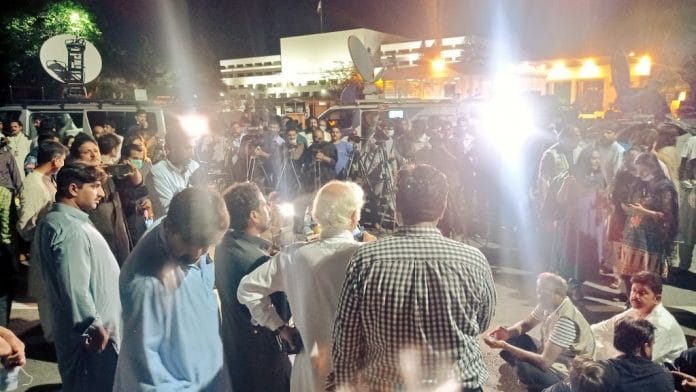The announcement of the setting up of a new media regulatory body in Pakistan has brought the Imran Khan government under severe criticism. Media organisations, human rights defenders and the opposition parties have demanded its withdrawal since May when the Pakistan Media Development Authority Ordinance 2021 was promulgated by President Arif Alvi.
While the Human Rights Watch has said that the PMDA “would allow unchecked powers to punish news outlets and journalists”, Amnesty International put out a report on its Twitter handle, capturing reactions on the law.
What does the proposed Pakistan Media Development Authority mean for journalists? @HamidMirPAK, @asmashirazi, @Benazir_Shah, @AmberRShamsi, @khattak63 and @UsamaKhilji explain. pic.twitter.com/XFAW21TD0V
— Amnesty International South Asia (@amnestysasia) September 20, 2021
ThePrint explains what this new legislation is and why journalists in Pakistan have demanded its withdrawal.
Also read: Pakistan’s Lal Masjid is back in news. This time with a Taliban flag
The backlash
Many Pakistani media organisations have expressed their opposition to the legislation. The Dawn called the proposed PMDA “no less than a declaration of war against journalists, and that if passed it may “prove to be the death knell for an independent media”.
The Nation criticised the government for “trying to bulldoze through legislation that puts more curbs on all kinds of media without getting stakeholders and the opposition on board… .”
Hundreds of Pakistani journalists last week staged a protest outside parliament, demanding the scrapping of the proposed PMDA, the media regulatory body through which the Imran Khan government seeks “greater control of the media” and “legalize censorship in Pakistan”.
Pakistani journalist Amber Shamsie, in a video statement with fellow journalists, said: “The PMDA is nothing short of an attempt to centralise censorship, to control what gets printed, what gets broadcast, and what gets posted”. Shamsie earlier hosted a political talk show on Samaa TV but quit allegedly due to the “self-censorship” rules that are in place in Pakistan.
Also read: Pakistani journalists are protesting Imran Khan’s ‘black’ law. Shehbaz Sharif is all ears
What is PMDA
The Pakistan Media Development Authority aims to regulate all forms of media including print, television, radio, films, advertisements, and digital media in the country, and get rid of the seven laws currently regulating the press, including the 20-year-old Pakistan Electronic Media Regulatory Authority (PEMRA), a major body governing media in Pakistan.
The PMDA will be headed by a chairperson appointed by the President, and should be qualified to become a high court judge. The government will also appoint its four members and four members from other stakeholders, who shall be experts in law, media, human rights, and cybersecurity, to form the Media Tribunal.
The making of the draft has been a “secretive” process, with many journalists accusing the government of lying about consulting to media stakeholders before drafting the bill.
According to Pakistan federal information minister Chaudhry Fawad Hussain, there will be three tiers of appeal available if one is not satisfied with the decision taken by the PMDA, including the appellate commission, tribunal and the supreme court.
According to a report in The Nation, the idea to set up PMDA first came up in 2018 when the merger of PEMRA and the Press Council of Pakistan was proposed to form a body that would regulate media and social media.
Also read: Pakistani students are angry at police brutality. And people slam Imran Khan online
Provisions for different media
The proposed legislation is likely to tighten the government’s grip on all kinds of media in Pakistan. The body will be tasked to register new digital media platforms and oversee the enforcement of cyber laws.
In addition to regulating the operation of digital media, including online newspapers, web TV channels, OTT content platforms, online news channels, video logs etc, the authority will also be responsible for granting NOC for exhibition, shooting and production of films, without which, no person shall engage in media service.
In a video statement released by the Digital Media Wing of the ministry of information, Chaudhry announced that registered Pakistani YouTubers would be “entitled to government advertisements under the PMDA”, Dawn reported.
He has also mentioned that the proposed legislation will empower the authority to impose a fine of up to Rs 250 million for violations of the provisions by the electronic media, and that channels on social media platforms, particularly YouTube, would be bound to air at least 30 per cent Pakistani content.
Of the 1,672 newspapers approved by the Audit Bureau of Circulation, Chaudhry said, around 800 did not meet the requirements for their approval, saying that their declarations would be canceled soon.
The authority will also fix the salaries of media employees and resolve pay disputes.
With Pakistan media already having limited press freedom under the Imran Khan-led government, this bill is said to further expand the government’s control of the media. And importantly, even snatch the fundamental rights of the common citizens of Pakistan.
Various Pakistani opposition party leaders have also condemned the PTI government’s move, calling the proposal a “black law”.
Asif Ali Zardari, leader of the Pakistan People’s Party, said: “The opposition will jointly oppose this black law to fight the law through all available means even if it is passed”.
The proposed law comes after PM Imran Khan featured in a list of leaders known for having a history of being involved in a massive crackdown on press freedom.
(Edited by Anurag Chaubey)






